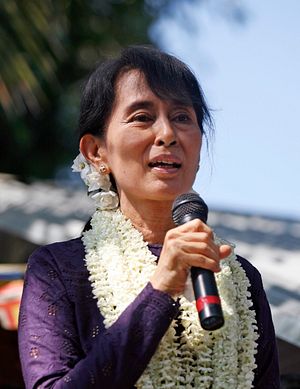On February 1, Myanmar’s newly elected parliament convened its first session following watershed elections last November, which saw a landslide victory for the opposition National League for Democracy (NLD).
In those elections, the NLD, which is led by democracy icon Aung San Suu Kyi, captured 390 out of 491 contested seats in both houses of parliament, surpassing the two-thirds majority it needed to form a government and handpick the next president (a quarter of the total of 664 parliamentary seats in both houses are reserved for the military according to the constitution). The ruling Union Solidarity and Development Party (USDP) only won 42 seats (See: “Myanmar’s Opposition Clinches Majority in Election Win”).
While 80 percent of elected seats in the new parliament will be made up of members of parliament (MPs) from the NLD, many of them are political novices thrust into the limelight following the country’s first openly contested general election in a quarter century.
On Monday, hundreds of these new NLD lawmakers were sworn into Myanmar’s parliament. As expected, the new parliament also elected U Win Myint of the NLD as the speaker of the lower house and U Ti Khun Myat of the USDP as deputy speaker.
“Today is a day to be proud of in Myanmar’s political history and for the democratic transition,” U Win Myint said in an acceptance speech.
One of the new parliament’s most important tasks will be to select a new president when the country’s outgoing leader Thein Sein steps down at the end of March. Although Suu Kyi herself is banned from assuming the presidency, her party will have a big say in who is appointed. Under the country’s laws, each of the parliament’s two chambers – both dominated by the NLD – will appoint one presidential candidate, with military officials, who hold a quarter of all seats, also putting forward one candidate. The two chambers will then vote on the three candidates, with the winner becoming president and the other two serving as vice-presidents.
Regardless of who wins the presidency, Suu Kyi has said that she will be “above the president,” although she has not clarified exactly what such a role would entail. A new government must be formed before March 31, when the current one will be dissolved.

































